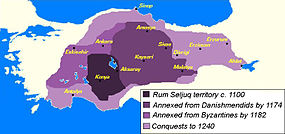آنادولو سلجوقلو دؤولتی
روم سولطانلیغی یا سلجوقیان روم و یا آنادولو سلجوقلو دؤولتی (۱۰۷۳-۱۳۱۸) – سلجوقلولارین آنادولودا قوردوغو دؤولت. قوروجوسو قوتالمیشین اوْغلو سلیمان شاهایمیش.
آنادولو سلجوقلو دؤولتی Anadolu Selçuklu Devleti سلجوقیان روم Saljūqiyān-i Rūm | |||||||||||||||||||||||
|---|---|---|---|---|---|---|---|---|---|---|---|---|---|---|---|---|---|---|---|---|---|---|---|
| 1077–1308 | |||||||||||||||||||||||
 Expansion of the Sultanate c. 1100–1240 | |||||||||||||||||||||||
| وضعیت | سولطانلیق | ||||||||||||||||||||||
| پایتخت | ایزنیک قونیه سیواس | ||||||||||||||||||||||
| عۆموُمی دیللر | اسکی آنادولو تورکجهسی (آنادیلی، سارای دیلی و قوشون دیلی)[۱] فارس دیلی (رسمی دیل)[۲][۳] یونان دیلی[۴] | ||||||||||||||||||||||
| دین | ایسلام سونیلر (رسمی) | ||||||||||||||||||||||
| Sultan | |||||||||||||||||||||||
• 1077–1086 | Suleiman ibn Qutulmish | ||||||||||||||||||||||
• 1303–1308 | Mesud II | ||||||||||||||||||||||
| تاریخی دؤنم | |||||||||||||||||||||||
• بؤیوک سلجوق دؤولتی from the بؤیوک سلجوق دؤولتی | 1077 | ||||||||||||||||||||||
| 1243 | |||||||||||||||||||||||
• death of Mesud II | 1308 | ||||||||||||||||||||||
| 1328 | |||||||||||||||||||||||
| اراضی | |||||||||||||||||||||||
| 1243 | ۴۰۰٬۰۰۰ km2 (۱۵۰٬۰۰۰ sq mi)Convert internal error: unknown message | ||||||||||||||||||||||
| |||||||||||||||||||||||
تاریخی
دَییشدیرتورکلرین آنادولویا یئرلشمهسی ۱۰۷۱ (میلادی)-اینجی ایلدکی مالازگیرت ساواشیندان سوْنرا سورعتلندی.
قایناقلار
دَییشدیر- ^ "Modern Turkish is the descendant of Ottoman Turkish and its predecessor, so-called Old Anatolian Turkish, which was introduced into Anatolia by the Seljuq Turks in the late 11th century ad.". Encyclopædia Britannica. یوْخلانیلیب30 September 2017.
- ^ Grousset, Rene, The Empire of the Steppes: A History of Central Asia, (Rutgers University Press, 2002), 157; "...the Seljuk court at Konya adopted Persian as its official language."
- ^ Bernard Lewis, Istanbul and the Civilization of the Ottoman Empire, (University of Oklahoma Press, 1963), 29; "The literature of Seljuk Anatolia was almost entirely in Persian...".
- ^ Andrew Peacock and Sara Nur Yildiz, The Seljuks of Anatolia: Court and Society in the Medieval Middle East, (I.B. Tauris, 2013), 132; "The official use of the Greek language by the Seljuk chancery is well known".